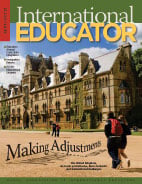The following appeared in the September/October issue of International Educator magazine.
 The United Kingdom has long been well-known for its excellence in higher education. The universities of Cambridge and Oxford are world-class institutions that many nations, including the United States, have tried to emulate. They say imitation is the sincerest form of flattery—in terms of higher education in the United Kingdom, times are changing. Recent years have brought many changes to the higher education sector in England, Northern Ireland, Scotland, and Wales.
The United Kingdom has long been well-known for its excellence in higher education. The universities of Cambridge and Oxford are world-class institutions that many nations, including the United States, have tried to emulate. They say imitation is the sincerest form of flattery—in terms of higher education in the United Kingdom, times are changing. Recent years have brought many changes to the higher education sector in England, Northern Ireland, Scotland, and Wales.
Increasing tuition for both domestic and international students has been on the rise. This is quite a shift for UK students—in the past, pursuing a university education was largely subsidized by the government. With the increase of fees for international students, the UK sees more funding per student, which can help defray budget cuts that have been instituted due to the global economic downturn, but it can deter international students from coming to the UK due to the higher cost.
Additionally, the UK was largely seen as the preferred place to pursue higher education to learn in English in Europe in decades past, but today many European nations now offer degree programs in English thereby minimizing the monopoly the UK held. So it invites the question: Where will these international students, who may once have almost automatically gone to the UK, now go?
Britain’s former Prime Minister Tony Blair instituted an initiative in 2006 to try to recruit 100,000 more international students by 2012, which made welcoming international students a national priority. It seemed that welcoming international students to the UK was universally acknowledged as a good thing; today international students make up 15 percent of students enrolled at UK institutions. But in 2010, international students in the UK became the target of immigration issues. The government began to see international student visas as a weakness in border control, which set the road for stricter student visa requirements, thereby making the UK a less attractive higher education destination. In March 2011 the government announced changes to the visa system, one of which was ending the opportunity for international students to stay and work in the UK for a period after graduation. This issues cover story, “Making Adjustments,” examines the challenges the UK higher education sector is facing and how institutions are dealing with them.
Preview the September/October 2012 issue of International Educator magazine.
